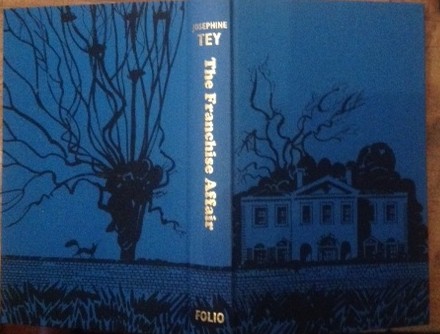Inspiring Older Readers
 posted on 30 Apr 2020
posted on 30 Apr 2020
The Franchise Affair by Josephine Tey
Published in 1949, this amiable mystery novel by Josephine Tey (pen name of Elizabeth Mackintosh) has slowly accumulated a considerable fan club among crime aficionados – indeed the Crime Writers Association has included it in its list of the top one hundred crime novels of all time.
Given the date of authorship, you’d probably expect it to have plenty in common with other crime fiction of that period, much of it pioneered by women authors – Christie, Allingham, Marsh etc. But actually, although this is true to a large extent, I would want to argue that, overall, Tey’s writing, plotting and sense of the mysterious are a tad superior to all those eminent rivals.
I’m always a bit unsure of just how much of the structure of any mystery or crime novel to reveal in a review and so I try to keep to a minimum at all times. What is safe to say is that the action is set in a sleepy English provincial town where a very conservative young solicitor, Robert Blair, who is committed to his routines, is about to have his world turned upside down by a phone call.
The call comes from the Sharpes, a mother and her daughter Marion, who have taken up residence in the Franchise, an unprepossessing, walled ‘big house’ on the edge of the town. The Sharpes are mysterious and stand-offish but need Blair’s help because they have been charged with abducting a teenage girl, keeping in what we’d today call ‘modern slavery’ and physically abusing her. They strenuously deny the charge and Blair takes up the case on their behalf.
However, this is not the sort of law that Blair and his firm are equipped to deal with and he finds himself having to learn as he goes along and to rely on his network of sturdy and loyal friends. The question is, has Blair become blinded to the truth by his increasing fascination for Marion Sharpe? The young girl's evidence seems damning and yet there’s something about her that just doesn’t sit right with Blair and he’s determined to find out what really happened.
At no point does Tey really allow the reader to think they’ve worked out for sure whether the abducted girl is telling the truth or lying and much of the impact of the book – the real page turning characteristic – is the uncertainty. With the story being told largely through Blair’s perspective, the reader identifies strongly with this perfect example of the English conservative – slow to motivate but dogged and determined once roused.
Tey was clearly a reactionary old soul and there are some social attitudes on display here that will make many a modern reader wince. The gender politics are dreadful and the morality seems to come from the Ark but, oddly enough, it doesn’t really seem to get in the way too much. The storytelling skill seems to override these sorts of objections and the suspension of disbelief isn’t unlike settling down to watch a television version of Poirot, Father Brown or probably (though I’ve never done it) an episode of Midsomer Murders.
But all the cosiness you’ll find in those mystery murders is undermined in Tey’s book by the suggestions of brutality, sadism, teenage sexuality and xenophobia that ripple through the book like an unnoticed backwash. Beneath the surface of this novel and the jolly decency of characters like Blair, there lurks a dark heart that grows to unsettle the reader.
One great fan of the book, novelist Sarah Waters, points to The Franchise Affair as providing some of the inspiration for her own book, Little Stranger. Writing in The Guardian in 2009 she says of the book's influence:
“The Franchise Affair is a phobic novel - one might even say, a hysterical novel; and it was somewhere in that hysteria, I started to think, that the germ of my next novel might really lie.”
Is there really a better endorsement?
Copies are readily available in cheap paper and hardback editions if you feel moved to read this one.
Terry Potter
April 2020